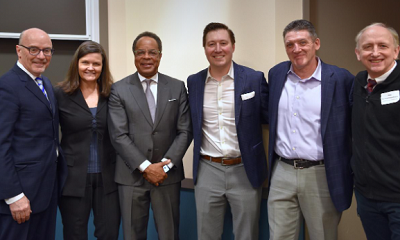
A gathering of commercial real estate professionals, government officials and acidemias acknowledged the challenges the City of Chicago continues to face in the aftermath and long-term repercussions of the global pandemic yet sounded an optimistic tone in looking to the future.
“I don’t see today’s struggles as insurmountable,” said Reagan Pratt, Douglas & Cynthia Crocker Endowed Director, The Real Estate Center at DePaul University. “Functions can happen anywhere, but they don’t happen everywhere.”
Earlier this month, DePaul’s Real Estate Center and Chaddick Institute for Metropolitan Development hosted The Great Reset: Changing Dynamics of the Downtown Chicago Real Estate Market. Pratt was joined in the program by Joseph Schwieterman, the Chaddick Institute; William Kling, the Chaddick Institute; Michael Edwards, Chicago Loop Alliance; Lamont Robinson, City of Chicago; Regina Stilp, Farpoint Development; Quintin Primo III, Capri Investment Group; and Derek Fohl, Newmark.
Edwards, who leads the Chicago Loop Alliance, noted statistics that point to improving momentum downtown. Examples include that traffic has reached 90% of pre-pandemic levels, though the pace is different based on the time and day of the week. Further, he highlighted that 10 live entertainment venues attract 1.3 million theater goers annually. Those venues delivered $800 million of economic impact during 2023’s second through fourth quarters. Yet from the real estate perspective, he said that values have declined significant, equally as much as 40 to 60% or more.
Yet one person’s pain is another one’s gain. Farpoint’s Regina Stilp, a native Chicagoan, said the incredible discounts make the investments more attractive and competitive.
“You either believe in Chicago or you don’t,” she said. “Chicago is what we believe in and where we are seeing opportunities.”
In the last six months, Farpoint has acquired a number of different assets in Chicago, including 830 N. Michigan Ave. “Coming back to the urban core is a thing,” Stilp said.
Quintin Primo highlighted various elements and milestones of his firm’s Google deal, in partnership with Michael Reschke, at the former State of Illinois Building. He recalled that a Google representative characterized the building as a Google building with the greatest potential, but the least likely to get approved. But six months later a transformative build-to-suit redevelopment deal was struck. The asset’s redevelopment is expected to be catalytic for that area of the Loop, and the City overall—a welcome impact addressed by many.
Derek Fohl, an office capital markets specialist with Newmark, said, “We need to get people to Chicago, to change the perception and the narrative. We need to get the wins and build greater momentum.”
Primo agreed and suggested that one of the factors driving that movement will be increasing levels of people, especially young people, going into the office. “No students are dying to graduate only to go work from home,” he said.
Fohl said that a variety of stats, from vacancy to absorption to sublease availabilities truly hit home about the need for a broad reset in the office sector. He also noted that one of the resets is an ongoing flight to quality buildings and quality space in an asset’s stacking plan.
“From a value perspective, smaller building size is better until the debt market makes a return,” Fohl said. “But in the long run, trophy is where it’s at.”
There is no argument that for a reset that includes acquisitions and redevelopments to occur, capital flowing into Chicago is essential, and currently a challenge with many investors redlining the city.
Primo said, “There is more liquidity in the world than ever. The U.S. is the safest haven for investment and it’s just a matter of time before capital comes back.”
Stilp added that the pendulum always swings which is, in part, the basis for her company’s belief that “the more we do in ‘24, the more we’ll drive in ’25.”
“When looking at investing, it’s necessary to flip the paradigm and the narrative,” Primo said. “Food deserts are opportunities; you just have to look at things with fresh eyes.”